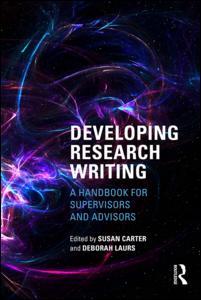Description
Developing Research Writing
A Handbook for Supervisors and Advisors
Coordinators: Carter Susan, Laurs Deborah
Language: English
Keywords
EAL Student; Developing; Reader Friendly Text; Research; EAL; Writing; Doctoral Writing; Handbook; Literature Reviews; Supervisors; Doctoral Candidates; Advisors; Writing Feedback; Carter; Supervisory Relationship; Laurs; Research Supervision; Higher Education; Supervisor Expectations; Doctorate; Face To Face; Phd; Doctoral Journey; Deborah Laurs; Professional Development; John Bitchener; Journal Reviewer; Vijay Kumar; Academic Writing Style; Elke Stracke; Writer’s Block; Barbara M; Grant; Supervisor’s Feedback; Linlin Xu; Doctoral Learning; Anne Lee; Academic Voice; E; Marcia Johnson; Doctoral Supervision; Andrea Haines; Doctoral Education; Cally Guerin; Research Writing; Claire Aitchison; Researcher Graduates; Inger Mewburn; Participant Doctoral Students; Pat Thomson; Residential Retreat; Helen Sword; Rachael Cayley; George D; Gopen; Martin East; Juliet Lum; Liz Beddoe; Jane Maidment; Sandra Nicol; Sarah C; Cornelius; Sharon Sharmini; Barbara Bolt; Paul J; Silvia; Rowena Murray; Gina Wisker; Margaret Kiley; Sue Starfield; Alet P; Olivier; Lisa Chant; Ema Wolfgramm-Foliaki; Eva M; Brodin; B; Liezel Frick; Tai Peseta; Sarah Barradell; Anthony Paré
Publication date: 08-2017
· 15.6x23.4 cm · Paperback
Publication date: 08-2017
· 15.6x23.4 cm · Hardback
Description
/li>Contents
/li>Readership
/li>Biography
/li>
Developing Research Writing is designed to encourage, inspire and improve the advisory practice of providing writing feedback. This book provides insights and advice that supervisors can use to advance their support of their research students? writing and, at the same time, survive increasing supervisory demands.
Book parts are framed by empirical supervisor and doctoral student experiences and chapters within each part provide multiple approaches. The carefully chosen contributors are specialists on research writing and doctoral pedagogy, who guide the reader through the key stages of providing feedback. Split into nine key parts the book covers:
- starting a new supervision with writing in focus;
- making use of other resources along the way;
- encouraging style through control of language;
- writing feedback on English as an Additional Language (EAL) writing;
Master?s and Honours smaller projects? writing feedback;
thesis by publication or performance-based writing;
maintaining and gathering momentum;
keeping the examiner happy;
writing feedback as nudging through identity transition.
The parts cohere into a go-to handbook for developing the supervision process. Drawing on research, literature and experience, Developing Research Writing offers well-theorized, yet practical and grounded advice conducive to good practices.
Acknowledgements *
Who we are: contributors’ biographical details *
Editors *
Chapter authors *
Introduction: opening the books on research writing feedback *
Part I: Starting a new supervision with writing in focus *
The relationship between reading, thinking and writing the literature review component of a doctoral confirmation proposal *
Settling students into a community of practice *
Framing feedback expectations: A ‘pedagogy of explicitness’ *
Setting up frameworks *
Part II: Making use of other resources along the way *
The role of tertiary learning advisors in successful doctoral completion *
Making the implicit explicit: generic writing workshops *
Peer-writing groups *
Online thesis-writing resources *
Part III: Encouraging style through control of language *
Giving feedback on grammar and style *
Giving early feedback to doctoral writers *
How to improve your advisees’ writing permanently—in 30 minutes *
Part IV: Writing feedback on English as an Additional Language (EAL) writing *
Written feedback typically provided on L2 students’ chapter drafts *
Five approaches to supporting students writing in English as an additional language *
Feeding back on research writing: New Zealand supervisors’ priorities with an L2 focus *
Part V: Master’s and Honours smaller projects’ writing feedback *
Supervising master’s/honours: A project management approach to researcher development *
Directive feedback in honours’ or master’s degree research *
Effective supervision of master’s researchers in professional contexts *
Part VI: Thesis by publication or performance-based writing *
Feedback from journal reviewers: writing a thesis by publication *
Supervising a thesis that includes publications *
Finding my voice(s) in the creative arts thesis *
Part VII: Maintaining and gathering momentum *
Writing Methodically: Teaching Students by Our Words and Deeds *
Writing prolifically *
Strategies for helping students through writer’s block *
Part VIII: Keeping the examiner happy *
Helping students demonstrate mastery of doctoral threshold concepts *
Building bulwarks: Defence in thesis writing *
What examiners value in a PhD *
Keeping the examiner happy – things to do: *
Part IX: Writing feedback as nudging through identity transition *
Writing an identity into being *
Negotiating agency through authorial voice in thesis writing *
Cultural identity/researcher identity: managing multiple positionings *
The SISA matrix for feedback fostering doctoral students’ creativity *
Managing those haunting voices: A student and supervisor in dialogue *
Thinking rhetorically: A pragmatic approach to texts
Conclusion *
Bibliography *
Index *
Susan Carter is Senior Lecturer in the Centre for Learning and Research in Higher Education (CLeaR), University of Auckland, New Zealand.
Deborah Laurs is Senior Learning Advisor in Student Learning Te Taiako, Victoria University of Wellington, New Zealand.




